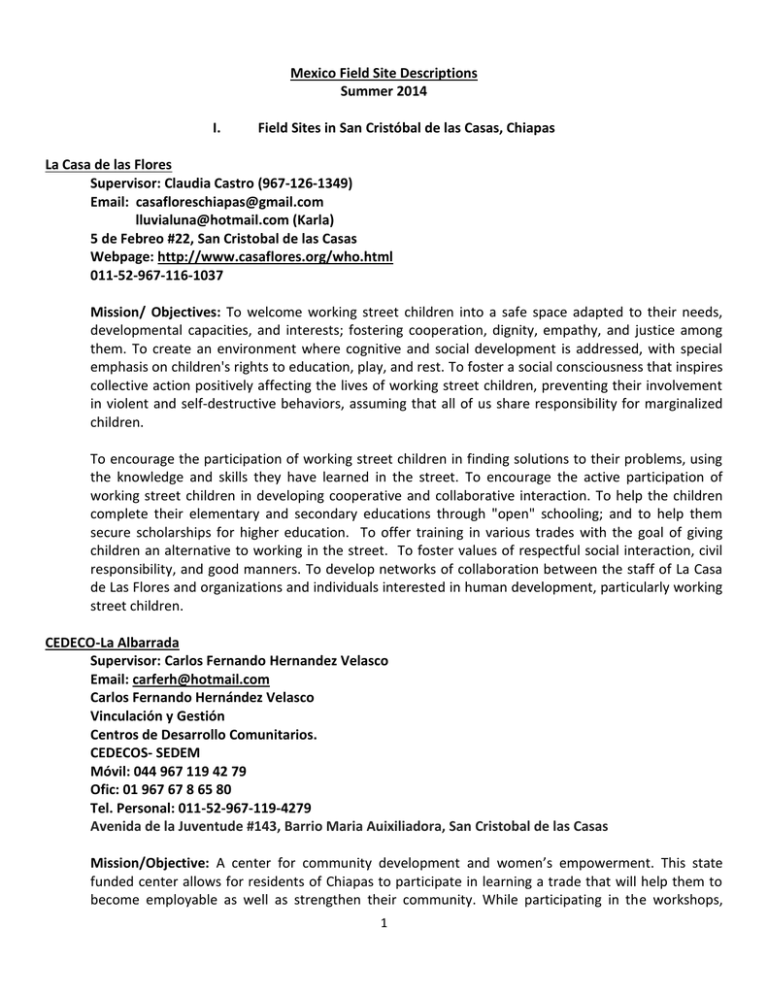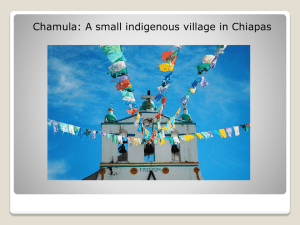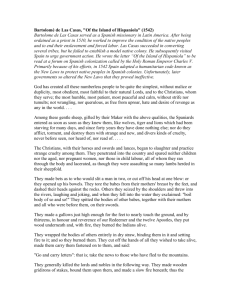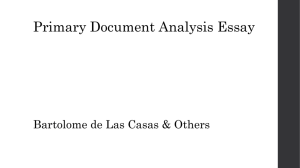Mexico Field Site Descriptions Summer 2014 I.
advertisement

Mexico Field Site Descriptions Summer 2014 I. Field Sites in San Cristóbal de las Casas, Chiapas La Casa de las Flores Supervisor: Claudia Castro (967-126-1349) Email: casafloreschiapas@gmail.com lluvialuna@hotmail.com (Karla) 5 de Febreo #22, San Cristobal de las Casas Webpage: http://www.casaflores.org/who.html 011-52-967-116-1037 Mission/ Objectives: To welcome working street children into a safe space adapted to their needs, developmental capacities, and interests; fostering cooperation, dignity, empathy, and justice among them. To create an environment where cognitive and social development is addressed, with special emphasis on children's rights to education, play, and rest. To foster a social consciousness that inspires collective action positively affecting the lives of working street children, preventing their involvement in violent and self-destructive behaviors, assuming that all of us share responsibility for marginalized children. To encourage the participation of working street children in finding solutions to their problems, using the knowledge and skills they have learned in the street. To encourage the active participation of working street children in developing cooperative and collaborative interaction. To help the children complete their elementary and secondary educations through "open" schooling; and to help them secure scholarships for higher education. To offer training in various trades with the goal of giving children an alternative to working in the street. To foster values of respectful social interaction, civil responsibility, and good manners. To develop networks of collaboration between the staff of La Casa de Las Flores and organizations and individuals interested in human development, particularly working street children. CEDECO-La Albarrada Supervisor: Carlos Fernando Hernandez Velasco Email: carferh@hotmail.com Carlos Fernando Hernández Velasco Vinculación y Gestión Centros de Desarrollo Comunitarios. CEDECOS- SEDEM Móvil: 044 967 119 42 79 Ofic: 01 967 67 8 65 80 Tel. Personal: 011-52-967-119-4279 Avenida de la Juventude #143, Barrio Maria Auixiliadora, San Cristobal de las Casas Mission/Objective: A center for community development and women’s empowerment. This state funded center allows for residents of Chiapas to participate in learning a trade that will help them to become employable as well as strengthen their community. While participating in the workshops, 1 which last anywhere from 2-6 months, participants stay in dorm-style housing and are provided daily meals. While living at La Albarrada participants are required to take part in several programs focused on environmental awareness, sustainability and human development. Within La Albarrada there is a year-long program for women called “Mujeres Floreciendo” (blossoming women) which focuses on three themes: human development, learning a trade and community development. Local women from Chiapas are required to participate in the programming for a year and spend anywhere from 2-4 days at the site (4 hours a day) depending on which theme they are participating in. Women are provided child care during this time and children participate in a developmental curriculum. K’inal Antsetik, A.C. Supervisor: Ricardo Iglesias Email: ricardoigl@hotmail.com Tel Officina 01 967 11 25 072 Cel 045 967 128 74 77 Webpage: http://www.kinalantsetik.com/ Calzada de la Escuela #25. Barrio La Quinta San Martín. San Cristóbal de las Casas. Chiapas. 29247. México. Tfno: 00.52.967.1125.072 Email: kinalantsetik@gmail.com Mission/Objectives: K´inal Antsetik A.C. (“Tierra de Mujeres”, (land of women) in Tseltal) is a nonprofit civil association that started in 1991 (and was legally constituted in 1995). The organization pursues the empowerment of indigenous women in Chiapas by strengthening their organizing, generating autonomy and increasing capacity so as to encourage participation in all spheres of political, social, economic and cultural life. K’inal aims to help indigenous women overcome situations of discrimination and transform gender equity so as to sustain and enhance women’s roles as active participants in the development of their communities. They work from the perspective that the indigenous women play an active role in the development. Their areas of focus include: product development and sales; community health; education and leadership training; and women’s rights. Red de Comercio Alternativo Abya Yala, ACC (RICCA) RED DE COMERCIO ALTERNATIVO, ABYA YALA, ACC (RICAA) Barrio la Merced, Centro, San Cristóbal de las Casas Carmen Cano Tel 967 67 885 19 Cel 045 967 1055698 Mission/Objective: RICCA aims to provide indigenous women in Chiapas, with a comprehensive education so as to enhance their self-agency, and in turn transform their environment. RICCA is an autonomous organization of indigenous women in Chiapas, who are: aware and able to offer alternative solutions to community problems; and contribute to socio-economic development for the construction of a more just, equitable and sustainable community caring for Mother Earth. 2 Centro de Capacitación en Ecología y Salud Centro de Capacitación en Ecología y Salud, A.C. Av. La Almolonga 80, Barrio Santa Lucía, San Cristóbal de las Casas. Dr. Marcos Arana Marcos.arana@prodigy.net.mx http://ccesc-chiapas.blogspot.mx/ 967-631-5735 044 967 10 62 196 Calle de la Almolonga 80, San Cristobal de las Casas Celia: CCESC_chiapas@yahoo.com; celular de Celia: 967-683-4776 Mission/Objective: The DDS CCESC- AC is a health and ecology training center for peasants that promotes a model of health education based on a concept of rights. The center has worked in the Altos, Norte and Selva de Chiapas, Mexico since 1983. The goal of the organization is to strengthen local capacity to improve the living conditions and health, consciousness and enforcement of rights. They believe that the poor living conditions, and all the problems it generates, are a result of the low capacity to exercises individual and community rights. Their work mainly targets rural and indigenous population. They work with women, children, youth and local actors, such as health workers, midwives, community leaders and municipalities, immigrants and returnees. NATIK Anita Smart, Executive Director Email: abrakadabra.ajs@gmail.com http://natik.org/ Mission/Objective: Natik empowers marginalized communities to transform themselves through collaborative and innovative solutions to poverty. This organization facilitates partnerships and dialogue between grassroots organizations and young leaders to expand educational opportunities and work toward economic empowerment for women. They align their work in Guatemala and Chiapas with the first three Millennium Development Goals established by the United Nations. Towards this end NATIK’s goals include: Goal 1: We will contribute to the eradication of extreme poverty and hunger through programs that facilitate economic empowerment of women and programs that educate children and youth. Goal 2: We will contribute to universal education through community learning centers, scholarship programs, and the education of future educators. Goal 3: We will promote gender equality by empowering women as income earners and agents of change in their communities. Possible summer projects are as follows: 3 Remedial Education Program, which runs every Saturday with about 35 indigenous children. This could be extended to a daily summer program with the goal of engaging the children in fun activities and movement. A home study performed by a Natik staff person, with the goal of collecting baseline data for a poverty index. Student intern would be shadowing the Natik staff member during the data collection, helping with documentation, and helping to record the stories of the community members as a way to document them, as well as to foster Natik’s media and fundraising campaign. Traditional farm community gardens program, for which Natik is currently applying for funding. The program would aim to foster nutrition in the community and promote involvement and sales at the local level. Student intern would help to raise awareness in the community, identify people to participate in the program, and develop a nutrition curriculum program for a lowliteracy level population. Intensive two- or three-week-long projects building community playgrounds. Fundacion Leon XIII Raúl Tinoco Guevara, Comunicación Tel. (0155) 5540 7656 rtinoco@fundemex.org.mx www.fundemex.org.mx https://www.youtube.com/watch?v=_yfFwcIXVGE Calzada de la Escuela 9, San Cristobal de las Casas Rosario Composeca Marua Pinto Mission/Objectives: The “Tejiendo Juntas” (or, Weaving Together) project works with local artisans in San Cristobal de las Casas. Student interns can develop workshops for the artisans that could focus on issues such as intrafamilial violence, development, life planning, family, and others. Students will also have the opportunity to visit various indigenous communities around the city of San Cristobal with the LEON XIII Foundation, which works closely with Fundemex. Aid to Artisans (ATA) Director: Maria Eugenia email: mariaeugeniap@creativelearning.org Tel oficina: +52 967-632-7985 webpage: aidtoartisans.org Franscisco i. Madero 69 Barrio Guadalupe San Crsitóbal de las Casas Chiapas. 29230. México Mission/Objectives: We create economic opportunities for artisan groups around the world where livelihoods, communities, and craft traditions are marginal or at risk. We blend a passion for the deeprooted cultures and handmade traditions of the developing world with a commitment to building profitable businesses. Environmentally sound practices are at the foundation of our methodology. We 4 recognize that we can only bring lasting economic growth if we provide an integrated approach to product development, business skills training, market access and eco-effective processes. We accomplish this by working together with partners in the countries where we work and in the markets we connect artisans with, leaving behind an infrastructure that continues to support the artisan community long after we complete our mentoring. III. Field Sites in Arriaga, Chiapas Albergue Arriaga Carlos Bartolo Solí Albergue Arriaga, 5a Sur # 1420, Arriaga, Chiapas 011-52-966-662-3797 (office) 011-52-1-966-741-0096 (cellular carlos.bartolo.solis (skype) https://www.facebook.com/pages/Casa-del-Migrante-Hogar-de-la-Misericordia/398513450229936 Mission/Objective: La Casa del Migrante "House of Mercy", was founded on October 7, 2004 in the response to the needs of the thousands of Central American migrants that pass through the Sacred Heart of Jesus Arriaga Chiapas, Mexico. By providing lodging, food, clothing, medical care, spiritual support and information about road hazards decreasing their vulnerability, La Casa del Migrante aims to respond to God’s call. The shelter is supported by the Social Pastoral office of this parish. La Casa del Migrante is guided by the understanding that: extreme poverty is a cause of migration; the fundamental right of every person to life; the contemporary imperative for those living in extreme poverty to migrate or die; and that people have the right to migrate for a better life for themselves and their family. Migrants as a person must be respected (as) in their human dignity, regardless of their immigration situation. The migrant experience is marked by anxiety, loneliness for abandoning his family and country, hence we as a church should be united and close to those who suffer. 5



